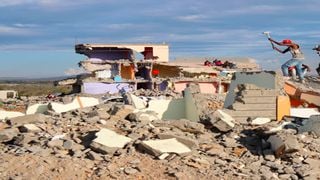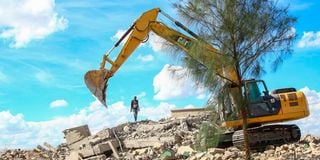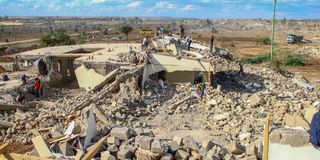
Demolished houses that were built on Portland Cement land in Mavoko, Machakos County, on October 17, 2023.
| File| Nation Media GroupNews
Premium
Mavoko demolitions awaken dark memories of Syokimau land scam
As the DCI summoned politicians, Lands officials and merchants for questioning over the sale of public land to unsuspecting Kenyans in Mavoko, it awakens a similar tragedy in Syokimau in 2011 for which no one has been punished.
An MPs’ investigation uncovered how the homeowners were duped by land companies conniving with rogue lands officials to an extent government entities received payments from the landowners that gave them false hope their land was genuine.
Just like in Athi River, the Syokimau scam that left 3,763 investors homeless unravelled in similar fashion with dubious merchants working in cahoots with cartels in the Ministry of Lands and sweet-talking land brokers ruining lives.
A forensic audit by the auditor general showed 250, 000 people may have been affected directly or indirectly by the demolitions.
Apart from the hundreds of millions invested in constructing palatial homes, the land buyers lost an initial Sh180m to purchase the dubious land.
The firms that pocketed the cash were Uungani (Sh73m); Jumbo (Sh65m); and Mulolongo Brothers (Sh42m).
In addition, Mavoko Council benefitted from land related payments totaling around Sh 54m.
The forensic audit directed by MPs’ who probed the scams found dozens of public officials and company officials had criminal culpability and recommended further police investigations with a view to prosecutions.
The recommendations including seizure of ill-gotten wealth to compensate the victims were never followed through.
Many more victims have since then fallen victim to the vicious cartels that have driven homeowners to depression, and in some cases suicide.
How plot is conceived
Picture this: A public entity seemingly does not protect its land, so that fraudsters prepare fake papers at the Lands office to hoodwink buyers into doing searches showing that they hold the correct mother titles.
The stage is then set for sub-division of the land and buyers who are confident about the papers start erecting multi million-shilling structures oblivious of the mess they have gotten into.
After the fraudsters are done selling the land, the public entity moves in to reclaim the land branding the homeowners illegal squatters and just as suddenly, the fake documents at the Lands office disappear and the genuine State title appears.
As distraught homeowners shed tears as manic bulldozers tear down their palatial homes, recommendations in subsequent inquiry reports that the fraudsters including rogue Lands officials are pursued to repay them are never implemented but continue to gather dust.
Meanwhile, the thieves disappear into thin air for some time as things cool down before moving on to the next victims.
A 2011 parliamentary report into the Syokimau demolitions is a stark reminder that Mavoko is just a continuation of similar land fraud scripts that have played out before in the country.
The joint committee on Administration and National Security, Lands and Natural Resources, Local Authorities and Transport, Public Works and Housing chaired by then MP Mutava Musyimi said the Kenya Airports Authority (KAA) never secured their land by fencing of the boundaries.
Much earlier, the forensic auditor had uncovered how the then Commissioner of Lands had set the stage for the subsequent fraud.
The auditors exposed double allocation of the JKIA land registered in favour of KAA in 1996.
This was facilitated in a subsequent survey in 2001 through which the Lands boss excised some roads and other parcels which were granted to private persons and titles issued.

An excavator demolishes a building built on the disputed Portland Cement land in Mavoko, Machakos County on October 18, 2023.
JKIA land shrank by 195 hectares compared to the land surveyed in 1996. At least 67 parcels were created within KAA land after 1996 and titles issued over them irregularly. These titles issued to private persons were never revoked.
The owners constructed houses that were spared during the demolition in Syokimau but others who had been allocated land by land buying companies were not as lucky.
Unsuspecting Kenyans fell prey to the three groups – Uungani Settlement Scheme Self Help Group, which was allocated land in 1996, Mlolongo Brothers and Jumbo Settlement Scheme.
According to the parliamentary report, the disputed land in Syokimau was compulsorily acquired by the government in 1971 for the development of Nairobi Airport, currently known as JKIA.
In 2003, however, Mlolongo Brothers Association claimed interest in one of the parcels measuring 100 hectares.
The Association was issued a title No. L-R- 85126 for L.R No. 13512 before going further to convert their allegedly acquired title LR. 85126 from Registration of Titles Act to Registered Land Act through J.R Aganyo & Associates surveyors based on legal gazette notice No 157/2010 which was forged. The said notice was published on August 26, 2010.
To illustrate how deep-rooted the scheme is, the Association paid to the Commissioner for Lands Sh4,770 on September 26, 2008 as fee to grant authority to Mlolongo Brothers to carry-out sub-divisions.
Sacred cows galore
The same case goes for Uungani Settlement Scheme self-Help Group which was granted an allotment letter by the Commissioner of Lands on September 20, 1996, which was certified by the Registrar of Lands on February 19, 2009.
An investigation ordered by the High Court after KAA moved to court in 2004 confirmed the deed plan was approved by the Director of Surveys in March 2008.
The Commissioner of Lands told the committee Mlolongo Brothers acquired the land measuring 100 hectares but with fake title as the genuine one for LR. 58266/1 is measuring only 5.42 hectares.
He said that on July 22, 2009, he noted the suspicious title and wrote to Mlolongo Brothers to submit a certified copy of the title but the group never responded.
The Commissioner said Mlolongo Brothers forged the signature of officer (Esther Gichira) and Minister (James Orengo), respectively to purport that a gazette notice was issued. For a notice to be published in the Kenya Gazette, it must be signed by the Minister for Lands.
The Commissioner launched investigations with relevant government agencies and it emerged all the documents used by the Association were fake.
However, the report said from the evidence before it, the Ministry of Land never took any measures to correct legal notice no. 157/2010 alleged to have been forged and published on 26 August 2010.
When Robert Asewe, the advocate representing about 160 victims of the Syokimau demolitions, appeared before the committee, he told the MPs all the transactions related to the disputed land were approved by all relevant government departments while the buildings were approved by Mavoko Municipal Council.
“From purchase to approval of buildings, the transactions were approved by competent authorities. Due diligence on ownership was done,” he said.
“It was a sweet land deal and I did not sense anything off as my neighbour had taken a loan with Barclays Bank and I was sure the banks did their due diligence. We were all happy and thought everything was fine,” said John Otieno, one of the victims of the Syokimau scam.
The report corroborated assertions by Mr Asewe, saying Lands Registry, Ministry of Lands in Machakos provided certified copies of land documents and in collaboration with the Mavoko Municipal council, approved land allocation and development plans respectively.
Further, the committee said from the evidence adduced, the residents of Syokimau bought the land from the two groups after carrying out searches on the land to authenticate its ownership and the relevant documentation. The searches were conducted individually and through law firms.
Disappearing file saga
In its findings, the committee fingered the Ministry of Lands over the controversial dealings surrounding land ownership in Syokimau, saying they should be held responsible.
The committee noted that there is always loss of files at the Ministry and the Registrar of Companies whenever there is a controversial issue over land and an investigation is ordered to that effect.
The report noted that a file showing payments made to the Ministry of Lands by the Uungani Settlement Scheme and Mlolongo Brothers Association could not be provided to the committee.
The committee also complained of lack of deed plans of the properties in Syokimau from the Ministry of Lands through the Director of Surveys in order to establish who undertook the surveys and on whose instructions.
“Payments were made to the Ministry of Lands by Uungani and Mlolongo based on documents obtained from the Ministry,” reads in part the report.
The report went further to note the existence of deliberate confusion set up by the KAA, City Council of Nairobi, and Mavoko Municipal Council.
According to the report, evidence given by the Director of Surveys showed the survey plan had been authenticated and Deed plan issued to the effect.
The survey was supported by a letter of allotment from Commissioner of Lands to Uungani settlement Scheme dated January 5, 1998 where the Group was claiming a piece of land measuring 449.9 hectares in Athi River.
Uungani Settlement Scheme was registered on April 30, 2008 by the Ministry of Gender, Culture and Social Services but they received the allocation letter from the Commissioner of Lands on September 15, 1996, the latter was certified by the Registrar of Lands.
“Uungani Settlement Scheme may have been in collusion with Ministry of lands officials to prepare, authenticate and grab public land. Documents presented by Mlolongo Brothers Association and Uungani Settlement Scheme have been discovered or declared not genuine as per the Ministry of Lands.
The report faulted members of professional bodies for being complicit in the mess. The Mlolongo Brothers were being represented by J.R. Angano & Associates.
In its recommendations, the Musyimi-committee called for the Lands ministry to computerise all land records in the country by establishing the National Land Information Management System as provided for in law within two years.
This was to eliminate the frequent problem of loss of files at the Ministry of Lands and the allocation of more than one title for the same parcel of land.
The committee also called for reforms in the ministry by vetting all officers to weed out corrupt officers and to dismantle the cartel that has fleeced the public.

Demolished houses built on Portland Cement land in Mavoko, Machakos County, on October 17, 2023.
The recommendation stemmed from finding by the committee that the fraudulent dealings in the demolished properties in Syokimau may have been as a result of fraudulent dealings or corruption by officials of the Ministry of Lands.
Invisible elephant of corruption
The committee established that there had been irregular and corrupt dealings over the years at the Lands ministry, resulting in excision of and allocation of public land to private individuals, recommended a purge of corrupt officials.
To correct the anomalies, the report pushed for implementation of the 2004 Ndung’u Land Report, which was an inquiry into illegal and irregular allocation of public land, within 90 days.
But far-reaching of all the recommendations was the call for an independent forensic auditor to determine the extent of the involvement of the Lands ministry, local government and other government agencies or individuals in those entities in relation to malpractice in land transactions culminating in the demolitions and evictions in Syokimau.
Former Auditor General Edward Ouko embarked on the forensic audit of the 2011 evictions and subsequently unveiled a damning report in June 2012.
Misrepresentation of ownership of land to group members; bribing of Ministry of Lands officers, forgery of documents, collecting money from members and the public by false pretence; subdivision of land without relevant consent; as well as aiding and abetting the construction by members without building permission were flagged.
Government officials, including the district lands and physical planning department officers in Machakos and the Commissioner of Lands, were found to have abetted the fraudulent deals.
According to the report, Uungani officials admitted they paid facilitation fees in order to obtain the forged documents.
The audit established the land belongs to KAA, however, it noted the existence of a history of surveys that created opportunities to excise the land and which have been used by various claimants as evidence of ownership over the area that was demolished in Syokimau.
He said the examination of claims by the land-selling companies; none was able to produce valid titles issued by the Ministry of Lands but title documents which were established to be forgeries.
In terms of responsibility and culpability, the report indicted officials of Mlolongo Brothers for being in possession of forged documents, and using forged documents of title to aid their members obtain irregular building approvals from Mavoko Council.
Further, the group was fingered for irregularly obtaining subdivision approvals from Mavoko Council in contravention of the Physical Planning Act and attempting to convert forged title documents.
Mr Ouko recommended that the Director of Public Prosecutions direct the CID to conduct further investigations with a view of obtaining further evidence and where appropriate prefer criminal charges on the officials of the group.
Further, the Ethics and Anti-Corruption Commission and CID were to urgently identify and freeze the assets of the group officials.
The audit fingered former Town Clerk of the Mavoko Council for assisting the officials to irregularly obtain subdivision approvals and issued a Rates Clearance certificate unlawfully over parts of the affected parcel of land in Syokimau.
More than 10 years later, no action has been taken on the officers fingered for culpability in the fraud that resulted in innocent Kenyans losing their lifetime savings.
Just like in the Syokimau incident, the DCI has set up victims’ complaints desks at Athi River Police Station to record statements from the affected individuals as part of the usual window-dressing exercises that follow such incidents.
And once this matter is forgotten like its predecessor, no action will be taken and we will wait for the next tragedy.





